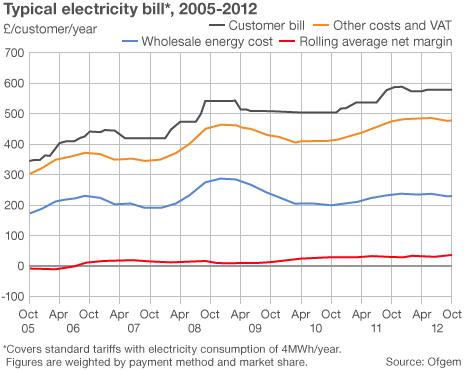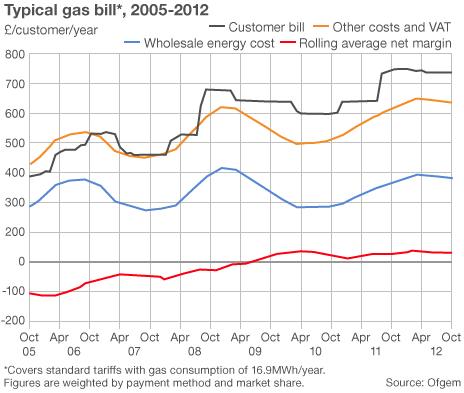Npower and British Gas raise energy prices
- Published
- comments
Richard Lloyd of Which? talks about his "shock and disbelief" at the price rises
Npower has joined rival British Gas in announcing it is increasing gas and electricity prices in the UK.
Npower will increase the price of gas by an average of 8.8% and electricity by 9.1% from 26 November.
Earlier, British Gas, the UK's biggest energy supplier, raised its charges for both types of fuel by an average of 6%, adding £80 a year to the average dual fuel bill.
The firms both blamed the government's policies as well as wholesale prices.
SSE - which trades as Scottish Hydro, Swalec and Southern Electric - has already said it will raise its prices by an average of 9% from Monday.
"There is never a good time to increase energy bills, particularly when so many people are working hard to make ends meet," Npower's chief commercial officer Paul Massara said.
"But the costs of new statutory schemes, increases in distribution charges and the price of gas for the coming winter are all being driven up by external factors, for example government policy."
British Gas recognised that its increase, which will take effect from 16 November, would be "unwelcome".
It also warned that the rising cost of government energy policies, including boosting renewable energy, improving households' energy efficiency and helping the poorest customers, was likely to add even more to household bills next year.
The cost of government policies and the national grid upgrade added £50 to the average household bill this year, and is expected to add another £60 next year, British Gas said.
Rising costs
Speaking to the BBC, Richard Lloyd of consumer group Which? criticised the lack of competition in the energy market.
"What we need to see is action from the government and more pressure on... these very big lazy companies who think it's OK to clobber people with above-inflation price rises at the very time when they can least afford it," he said.
Watchdog Consumer Focus said two price rises in one day would add to householders' worries that they were not getting a fair deal.
"Unless they can be reassured about the relationship between costs, prices and profits, consumer distrust will continue," said Consumer Focus director Audrey Gallacher.
British Gas managing director Phil Bentley claimed that 85% of the price it charged to customers was outside its control.
"Britain's North Sea gas supplies are running out and British Gas has to pay the going rate for gas in a competitive global marketplace," said Mr Bentley.
"Furthermore, the investment needed to maintain and upgrade the national grid to deliver energy to our customers' homes, and the costs of the government's policies for a clean, energy-efficient Britain, are all going up."
Phil Bentley: Investment "best way of keeping bills down"
It said that winter wholesale prices it pays were proving to be some 13% higher this year.
Speaking to the BBC, Mr Bentley pointed out that although wholesale prices are actually currently lower than a year ago, British Gas, like most utilities, fixes the price at which it buys gas well in advance, and these fixed prices had risen.
The company reported £345m profit in the first half of the year, but the chief executive said that he expected profits to be down in the second half.
"Our margins are 5p in the pound," he told the BBC. "That 5p is going into jobs for Britain, investments in new wind farms, investments in new gasfields."

Insulation
Despite rising prices, the number of people switching suppliers is falling, which consumer groups suggest is more evidence of lack of trust in the market.
"The recent price increases mean it is more important than ever that consumers are able to shop around for the best deal," said regulator Ofgem.
"Next week we will be announcing the next steps in introducing major reforms to make the household energy market simpler, clearer and fairer for customers," it said.
Consumer Focus said that the government and the energy regulator should do more to protect households from the effect of growing energy costs.

"From next year, an average of £4bn will be taken from consumer bills in the form of carbon taxes," Audrey Gallacher said.
"Using a proportion of that revenue to fund a much more ambitious energy efficiency programme could start to tackle fuel poverty and provide a jump start to our energy efficiency industry."
All the energy utility firms are obliged under the government's "Certified Emissions Reduction Target" (or "Cert") programme to cut the carbon dioxide output by households.
British Gas extended its offer of free loft and wall cavity insulation to non-customers earlier this year. Consumer groups suggested the company had done this because it risked missing targets.
British Gas claimed that customers that had already implemented energy saving measures had seen their fuel consumption drop by up to 40%, and as a result the average total fuel bills of its customers had not risen faster than inflation, despite the increases in fuel charge rates.
In addition, under the government's Warm Home Discount Scheme which began last year, energy suppliers agreed to give discounts on energy bills to older households who receive certain benefits.
Speaking to the BBC, energy minister Greg Barker said the scheme would mean two million of the poorest families would get £130 towards energy bills.
Labour said it would introduce a new energy regulator with powers to force energy companies to pass on savings to consumers and automatically put over-75s on the cheapest deal.
- Published12 October 2012
- Published22 August 2012